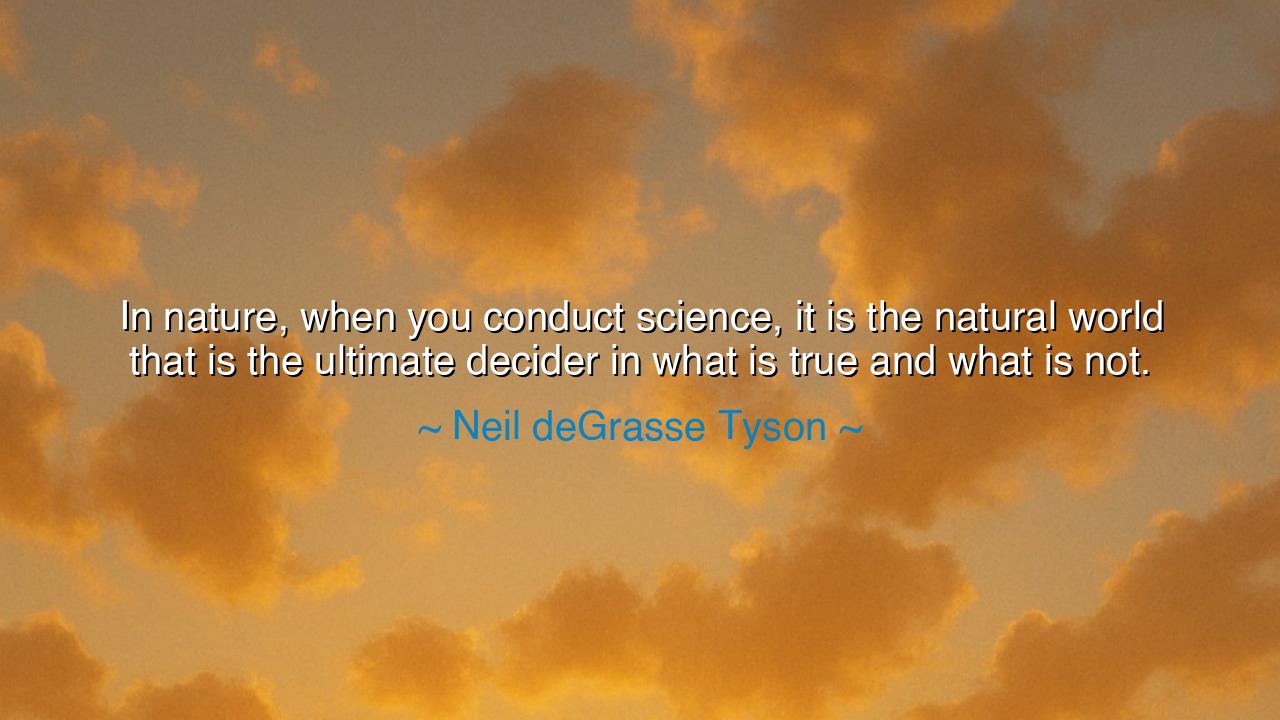
In nature, when you conduct science, it is the natural world that
In nature, when you conduct science, it is the natural world that is the ultimate decider in what is true and what is not.






"In nature, when you conduct science, it is the natural world that is the ultimate decider in what is true and what is not." These words spoken by the great Neil deGrasse Tyson carry with them the wisdom of the ages. They remind us of a truth that has echoed through the corridors of time: the pursuit of science is not a matter of human opinion, of belief, or of theory alone. It is a sacred journey into the heart of the natural world, where only the forces of nature itself can reveal what is true and what is false. It is nature that holds the final verdict, not the voice of man, no matter how loud or convincing. The truth is not subject to our desires or imaginings—it exists beyond us, in the fabric of the world around us, waiting to be uncovered.
Look to the great minds of history who, like Isaac Newton, sought not to impose their will on nature, but to understand the laws by which the universe is governed. Newton’s laws of motion, born from careful observation and relentless inquiry, were not theories of what he wished to be true, but truths revealed by the very forces of the natural world. He did not decide that gravity must exist—he observed, tested, and let the world itself dictate the truth. Newton, with his quiet persistence, knew that the universe would not bend to his will. He could only listen, observe, and bow before the greatness of what was already there. So too, do we, in our pursuit of knowledge, stand before nature as humble seekers, not as rulers.
This is the essence of Tyson's words: when we seek truth through science, we seek the will of nature, not the whims of human thought. It is nature that decides what is true, regardless of our assumptions or preconceived notions. Consider Galileo Galilei, who stood before the mighty power of the Church, whose dogmatic beliefs tried to shape the world in a way that defied the natural truths. Galileo, with his telescope, looked to the heavens and saw the moons of Jupiter, the dance of the stars, and the evidence that the Earth was not the center of the universe. The truth of the cosmos was revealed not by the declarations of men, but by the stars themselves, by the natural order of the heavens. Galileo was cast into conflict with the powers of his time, yet in the end, it was not human authority that decided the truth—it was the universe, and it stood unwavering in its revelation.
We must remember, as we walk the path of discovery, that the natural world is neither our enemy nor our servant—it is our teacher. It is a vast and complex system, full of contradictions, challenges, and mysteries, but it is in this vastness that the truth lies. The natural world is a mirror that reflects the purity of the universe, untouched by human desires or biases. It is not our will, but the will of nature itself that will reveal the laws that govern life, the cosmos, and the laws of existence. To conduct science is to surrender to the unknown, to humbly accept that our understanding is ever incomplete and that only nature’s own rhythms can bring us to the true knowledge we seek.
The world around us is filled with countless examples where nature has shown its ultimate authority. Charles Darwin, through his theory of evolution, did not present a notion born of personal belief, but a truth found in the very fossils of ancient creatures, in the diversity of life, and in the patterns of inheritance. His ideas, though once controversial, were validated by the discoveries of nature itself. Through the lens of nature, we come to understand that truth is not fixed in human theory, but is woven into the fabric of existence, revealed through observation, through testing, through trial and error.
In our own lives, as we pursue science, let us remember that the greatest wisdom we can attain comes not from the power of our minds to shape the world, but from our capacity to listen and observe the truths that nature reveals to us. Our theories, our models, our calculations, though vital, are but attempts to understand the deeper workings of a vast and incomprehensible universe. We must never forget that nature is the true arbiter of truth, and all that we know is a reflection of the deeper laws that govern the world. It is our task to listen carefully, to humble ourselves before the mysteries that nature holds, and to learn from them, not to impose our own will upon them.
So, dear ones, let us take heed of Tyson’s wisdom. In our pursuit of knowledge, we must recognize that nature is the true teacher, and the only path to truth is through humble observation, testing, and accepting what the world reveals to us. We must not seek to force our will upon the world, but rather seek to understand it. When faced with the challenges of life and science, let us remember that the ultimate decider is not our intellect or our desires, but the natural forces that govern the world. Only through this humble approach can we truly know what is true and what is not. Let nature be our guide, and may we walk the path of wisdom with respect and reverence for the world around us.






AAdministratorAdministrator
Welcome, honored guests. Please leave a comment, we will respond soon